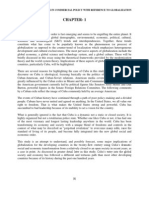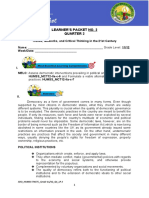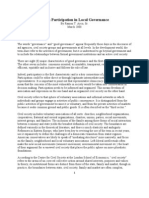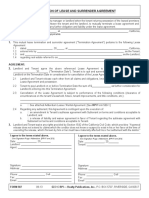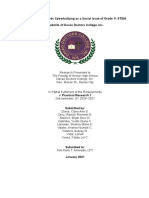0 ratings0% found this document useful (0 votes)
3 viewsExploring the C-wps Office
Uploaded by
jerubacaydelacruz16Copyright
© © All Rights Reserved
Available Formats
Download as DOCX, PDF, TXT or read online on Scribd
0 ratings0% found this document useful (0 votes)
3 viewsExploring the C-wps Office
Uploaded by
jerubacaydelacruz16Copyright
© © All Rights Reserved
Available Formats
Download as DOCX, PDF, TXT or read online on Scribd
You are on page 1/ 5
Group 10
GLOBAL CITIZENSHIP
What does Global Citizenship entail? In today's accelerated globalization process,
states and citizens are no longer the sole actors and objects of international
relations. In place of the old normative notion that states are the only entities
that carry and possess rights, duties, and freedoms, new subjects are emerging,
namely sub-state or infra-state entities such as regions or municipalities, non-
governmental organizations, and people themselves. This new development is
bound to have both descriptive, prescriptive, and normative impacts on the
current general concept of citizenship. The concept of Global Citizenship provides
interesting parameters for understanding the modern international system. This
chapter presents the descriptive, prescriptive, and normative assumptions of this
new citizen figure as an analytical and operational tool to understand and
measure the level of participation and organization of the new subjects in the
process of globalization that is transforming the international system, as well as in
the relations that citizens maintain with these new entities and the subjective
behavior of ordinary citizens in process of citizenship
Group 9
THE RELEVANCE OF THE STATE AMID GLOBALIZATION INSTITUTION THAT
GOVERN INTERNATIONAL RELATIONS
This article analyzes the role of states in the governance of international relations
and focuses on the abuse of distinction by their critics between high globalization
of the economy and low globalization of the state, while widening the scope of
analysis beyond the state versus society substituting structures and the state
versus other states, to include as well the state versus the global. The argument
develops in four steps. The first step identifies a series of criticisms leveled by
contemporary theorists to the state control of the market and of the international
arena. The underlying critique is, in each case, liberal.
Relevance is synonymous with being imperative, critical, or qualitatively
important, a significant or systematic effect. Since the peace of modern society is
imperiled when his own principles reach the age of the institutions he helped to
establish are surpassed, he remarked, modern society is the synthesis of
principles and institutions, and it is only when these principles and institutions are
in opposition, when one or the other is weakened, that society can be disturbed,
and its existence be brought into question. The weakness of any institution, we
think, does not derive from its non-operation, much less from its non-existence,
but rather from its loss of significance, from it commanding adherence not freely,
but rather grudgingly, manipulatively, ritualistically, and unreflectively. In
contemporary social debate, no institution is criticized more than the state, but at
the same time, no other is invested with the same expectations, with such an
important role in every individual's and society's plans of well-being.
Group 8
EFFECTS OF GLOBALIZATION TO GOVERMENTS
Governments must take steps to adapt to the economic globalization that has
been developing since World War II. The transformation of governments into
more globalized forms may soon show us how much social support there is for
corporate enterprises, manufacturing, technology, science, and other institutions.
In a world where currency, global technology, and investment power are
continually at one's doorstep, what steps will governments take to avoid social
injustice in wealth, educational opportunity, and health care? This book will
concentrate on the negative consequences of globalization on the social systems
of capitalism—primarily government, religion, education, and health care.
National economic borders have no meaning in the electronic world of computers
where rules are fixed by international consensus, managed by global industry, and
where disputes over conflicting trading rules are settled by its own bureaucracy.
Clearly, the new trading rules in a global economy support corporations while at
the same time weakening national governments and developing a philosophy of
globalization of the national social systems. Although governments continue to be
concerned about social support from their citizens, in the end, money power will
develop a philosophy such that all systems in the world of globalization will find a
way to survive without the core economic engines of money, technology, and
trade for health science, educational systems, and adequate government
revenues.
THE
CONTEMPORARY
WORLD
Submitted By: Jeru Bacay Delacruz
Submitted To: Mr, Johnny ray Estrada
You might also like
- LLM 103 - Law and Justice in A Globalizing World - Full Notes97% (30)LLM 103 - Law and Justice in A Globalizing World - Full Notes46 pages
- Lesson 4: Factors/Processes Pushing For Governance100% (1)Lesson 4: Factors/Processes Pushing For Governance9 pages
- Coll. - A Civil Economy - Transforming The Market in The Twenty-First Century-University of Michigan Press PDFNo ratings yetColl. - A Civil Economy - Transforming The Market in The Twenty-First Century-University of Michigan Press PDF221 pages
- Limited Access Orders in The Developing World - WBNo ratings yetLimited Access Orders in The Developing World - WB50 pages
- Social Capital and Development: The Coming Agenda: Francis FukuyamaNo ratings yetSocial Capital and Development: The Coming Agenda: Francis Fukuyama15 pages
- Edwards - Civil Society & Global GovernanceNo ratings yetEdwards - Civil Society & Global Governance14 pages
- Big Society, Small Government: Macalester InternationalNo ratings yetBig Society, Small Government: Macalester International14 pages
- World Governance Survey Discussion Paper 4 July 2003 Civil Society and Governance in 16 Developing Countries Goran Hyden, Julius Court and Ken MeaseNo ratings yetWorld Governance Survey Discussion Paper 4 July 2003 Civil Society and Governance in 16 Developing Countries Goran Hyden, Julius Court and Ken Mease29 pages
- Private & Public Governance: Thesis QuestionNo ratings yetPrivate & Public Governance: Thesis Question14 pages
- Graham - Peru@yahoo - Co.uk: Human Flourishing Project Briefing Paper 4No ratings yetGraham - Peru@yahoo - Co.uk: Human Flourishing Project Briefing Paper 432 pages
- Keohane - Robert - Global Governance and Democratic Accountability PDFNo ratings yetKeohane - Robert - Global Governance and Democratic Accountability PDF36 pages
- Rebuilding Society from the Ground up. Corporations and Citizens as a Source of Inspiration for SocietyFrom EverandRebuilding Society from the Ground up. Corporations and Citizens as a Source of Inspiration for SocietyNo ratings yet
- Social Contract 2 0 (28 March 2010) - DRAFTNo ratings yetSocial Contract 2 0 (28 March 2010) - DRAFT8 pages
- LIPSCHUTZ, Ronnie D. - Global civil society and global governmentalityNo ratings yetLIPSCHUTZ, Ronnie D. - Global civil society and global governmentality20 pages
- Brochure Guide To The Book Institutional Constraints On Modern Economic GrowthNo ratings yetBrochure Guide To The Book Institutional Constraints On Modern Economic Growth36 pages
- Summary Governance - Globalists vs. Sceptics (Mis) Managing The WorldNo ratings yetSummary Governance - Globalists vs. Sceptics (Mis) Managing The World4 pages
- Chapter-1: Trends in Commercial Policy With Reference To GlobalizationNo ratings yetChapter-1: Trends in Commercial Policy With Reference To Globalization37 pages
- 2006 Global Nongovernmental Administrative SystemNo ratings yet2006 Global Nongovernmental Administrative System31 pages
- Civil Society and Democracy in Global Governance100% (1)Civil Society and Democracy in Global Governance25 pages
- Impact of Globalization On Strategic ManagementNo ratings yetImpact of Globalization On Strategic Management9 pages
- Global Governance vs. National Sovereignty in A Globalized WorldNo ratings yetGlobal Governance vs. National Sovereignty in A Globalized World9 pages
- Global Civil Society Is Seen As The Backlash' To BothNo ratings yetGlobal Civil Society Is Seen As The Backlash' To Both5 pages
- TCWD #1 - "We Are A Government of Laws and Not of Men"No ratings yetTCWD #1 - "We Are A Government of Laws and Not of Men"5 pages
- Governance Democracy and Development in The Third WorldNo ratings yetGovernance Democracy and Development in The Third World21 pages
- YORK UNIVERSITY - 4700 Keele Street, Toronto, ON, Canada M3J 1P3 YORK UNIVERSITY - 4700 Keele Street, Toronto, ON, Canada M3J 1P3 York UniversityNo ratings yetYORK UNIVERSITY - 4700 Keele Street, Toronto, ON, Canada M3J 1P3 YORK UNIVERSITY - 4700 Keele Street, Toronto, ON, Canada M3J 1P3 York University24 pages
- Exchanging Autonomy: Inner Motivations as Resources for Tackling the Crises of Our TimesFrom EverandExchanging Autonomy: Inner Motivations as Resources for Tackling the Crises of Our TimesNo ratings yet
- Compare and Contrast Concept Map of Philippine, Singapore and Myanmar Educational SystemNo ratings yetCompare and Contrast Concept Map of Philippine, Singapore and Myanmar Educational System8 pages
- How Are Students Spending Their Money and How This Affects ThemNo ratings yetHow Are Students Spending Their Money and How This Affects Them2 pages
- Detailment of Candidates For SSB: Cdse Jul 2011 CourseNo ratings yetDetailment of Candidates For SSB: Cdse Jul 2011 Course18 pages
- The Dialectics of Decolonization: Nationalism and Labor Movements in Postwar AfricaNo ratings yetThe Dialectics of Decolonization: Nationalism and Labor Movements in Postwar Africa29 pages
- Termination of Lease and Surrender Agreement: Items Left Blank or Unchecked Are Not ApplicableNo ratings yetTermination of Lease and Surrender Agreement: Items Left Blank or Unchecked Are Not Applicable1 page
- Political Advertising in Kuwait A Functional Discourse AnalysisNo ratings yetPolitical Advertising in Kuwait A Functional Discourse Analysis102 pages
- Sectrans With Notes and Cases. Atty. Lerma. 2C. by Butch RamiroNo ratings yetSectrans With Notes and Cases. Atty. Lerma. 2C. by Butch Ramiro58 pages
- Legal studies for VCE, access and justice 14th Edition Lisa Filippin download pdf100% (4)Legal studies for VCE, access and justice 14th Edition Lisa Filippin download pdf50 pages
- West Bengal eDISTRICT 2.0 (Application of Certifited Copy of Registered Deed)No ratings yetWest Bengal eDISTRICT 2.0 (Application of Certifited Copy of Registered Deed)1 page
- VIP Salon Suites License Agreement - UpdatedNo ratings yetVIP Salon Suites License Agreement - Updated5 pages
- NORTHERN CHRISTIAN COLLEGE (FINAL PORTFOLIO)No ratings yetNORTHERN CHRISTIAN COLLEGE (FINAL PORTFOLIO)105 pages
- LLM 103 - Law and Justice in A Globalizing World - Full NotesLLM 103 - Law and Justice in A Globalizing World - Full Notes
- Lesson 4: Factors/Processes Pushing For GovernanceLesson 4: Factors/Processes Pushing For Governance
- Coll. - A Civil Economy - Transforming The Market in The Twenty-First Century-University of Michigan Press PDFColl. - A Civil Economy - Transforming The Market in The Twenty-First Century-University of Michigan Press PDF
- Limited Access Orders in The Developing World - WBLimited Access Orders in The Developing World - WB
- Social Capital and Development: The Coming Agenda: Francis FukuyamaSocial Capital and Development: The Coming Agenda: Francis Fukuyama
- Big Society, Small Government: Macalester InternationalBig Society, Small Government: Macalester International
- World Governance Survey Discussion Paper 4 July 2003 Civil Society and Governance in 16 Developing Countries Goran Hyden, Julius Court and Ken MeaseWorld Governance Survey Discussion Paper 4 July 2003 Civil Society and Governance in 16 Developing Countries Goran Hyden, Julius Court and Ken Mease
- Graham - Peru@yahoo - Co.uk: Human Flourishing Project Briefing Paper 4Graham - Peru@yahoo - Co.uk: Human Flourishing Project Briefing Paper 4
- Keohane - Robert - Global Governance and Democratic Accountability PDFKeohane - Robert - Global Governance and Democratic Accountability PDF
- Rebuilding Society from the Ground up. Corporations and Citizens as a Source of Inspiration for SocietyFrom EverandRebuilding Society from the Ground up. Corporations and Citizens as a Source of Inspiration for Society
- LIPSCHUTZ, Ronnie D. - Global civil society and global governmentalityLIPSCHUTZ, Ronnie D. - Global civil society and global governmentality
- Brochure Guide To The Book Institutional Constraints On Modern Economic GrowthBrochure Guide To The Book Institutional Constraints On Modern Economic Growth
- Summary Governance - Globalists vs. Sceptics (Mis) Managing The WorldSummary Governance - Globalists vs. Sceptics (Mis) Managing The World
- Chapter-1: Trends in Commercial Policy With Reference To GlobalizationChapter-1: Trends in Commercial Policy With Reference To Globalization
- Global Governance vs. National Sovereignty in A Globalized WorldGlobal Governance vs. National Sovereignty in A Globalized World
- Global Civil Society Is Seen As The Backlash' To BothGlobal Civil Society Is Seen As The Backlash' To Both
- TCWD #1 - "We Are A Government of Laws and Not of Men"TCWD #1 - "We Are A Government of Laws and Not of Men"
- Governance Democracy and Development in The Third WorldGovernance Democracy and Development in The Third World
- YORK UNIVERSITY - 4700 Keele Street, Toronto, ON, Canada M3J 1P3 YORK UNIVERSITY - 4700 Keele Street, Toronto, ON, Canada M3J 1P3 York UniversityYORK UNIVERSITY - 4700 Keele Street, Toronto, ON, Canada M3J 1P3 YORK UNIVERSITY - 4700 Keele Street, Toronto, ON, Canada M3J 1P3 York University
- Exchanging Autonomy: Inner Motivations as Resources for Tackling the Crises of Our TimesFrom EverandExchanging Autonomy: Inner Motivations as Resources for Tackling the Crises of Our Times
- Global Capitalism and the Crisis of DemocracyFrom EverandGlobal Capitalism and the Crisis of Democracy
- Compare and Contrast Concept Map of Philippine, Singapore and Myanmar Educational SystemCompare and Contrast Concept Map of Philippine, Singapore and Myanmar Educational System
- How Are Students Spending Their Money and How This Affects ThemHow Are Students Spending Their Money and How This Affects Them
- Detailment of Candidates For SSB: Cdse Jul 2011 CourseDetailment of Candidates For SSB: Cdse Jul 2011 Course
- The Dialectics of Decolonization: Nationalism and Labor Movements in Postwar AfricaThe Dialectics of Decolonization: Nationalism and Labor Movements in Postwar Africa
- Termination of Lease and Surrender Agreement: Items Left Blank or Unchecked Are Not ApplicableTermination of Lease and Surrender Agreement: Items Left Blank or Unchecked Are Not Applicable
- Political Advertising in Kuwait A Functional Discourse AnalysisPolitical Advertising in Kuwait A Functional Discourse Analysis
- Sectrans With Notes and Cases. Atty. Lerma. 2C. by Butch RamiroSectrans With Notes and Cases. Atty. Lerma. 2C. by Butch Ramiro
- Legal studies for VCE, access and justice 14th Edition Lisa Filippin download pdfLegal studies for VCE, access and justice 14th Edition Lisa Filippin download pdf
- West Bengal eDISTRICT 2.0 (Application of Certifited Copy of Registered Deed)West Bengal eDISTRICT 2.0 (Application of Certifited Copy of Registered Deed)




























